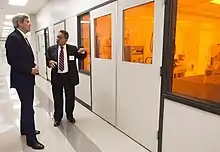Sanjay Banerjee
Sanjay Banerjee is an American engineer at the University of Texas at Austin, director of Microelectronics Research Center,[2] and director of the Southwest Academy of Nanoelectronics (SWAN) — one of three such centers in the United States funded by the Semiconductor Research Corporation to develop a replacement for MOSFETs as part of their Nanoelectronics Research Initiative (NRI).[3]
Sanjay Banerjee | |
|---|---|
 Professor Sanjay Banerjee discusses his work at the Microelectronics Research Center with former Secretary of State John Kerry (April 2016).[1] | |
| Alma mater | University of Illinois at Urbana-Champaign (Ph.D.) Indian Institute of Technology Kharagpur (B.Tech.) |
| Awards | 2014 IEEE Andrew S. Grove Award 2003 Electrochemical Society Thomas D. Callinan Award 2000 IEEE Millennium Medal 1988 National Science Foundation Presidential Young Investigator Award |
| Scientific career | |
| Fields | Electrical Engineering |
| Institutions | University of Texas at Austin |
| Doctoral advisor | Ben G. Streetman |
| Website | banerjeelab |
Career
Banerjee has supervised over 60 Ph.D students and 70 M.S. students at the University of Texas, where he is the Cockrell Family Regents Chair Professor.
Research
In 1986, he was awarded Best Paper at the IEEE International Solid State Circuits Conference for work on polysilicon transistors and dynamic random access trench memory cells used by Texas Instruments in the world's first 4 Megabit DRAM. He demonstrated the first three-terminal MOS tunnel FET as well as the first high-k dielectric/silicon-germanium quantum dot gates for flash memory.[4] He is active in the areas of beyond CMOS nanoelectronic transistors based on 2D materials and spintronics, fabrication and modeling of advanced MOSFETs, and solar cells.[5][6][7]
Publications
He has over 650 archival refereed journal publications and conference talks,[8] and he holds 30 U.S. patents. He is co-author with former Dean of the Cockrell School of Engineering Ben G. Streetman of the textbook Solid State Electronic Devices, currently in its 7th edition.
Honors and awards
Banerjee was elected Fellow of the Institute of Electrical and Electronics Engineers in 1996, Fellow of the American Physical Society in 2006, and Fellow of the American Association for the Advancement of Science in 2007. His awards include the 2014 IEEE Andrew S. Grove Award,[4] the 2008 Cockrell School of Engineering Billy and Claude R. Hocott Distinguished Centennial Engineering Research Award,[9] the 2005 Indian Institute of Technology Kharagpur Distinguished Alumnus Award, the 2003 Electrochemical Society Thomas D. Callinan Award, the 2000 IEEE Millennium Medal, and the 1988 National Science Foundation Presidential Young Investigator Award for high speed optoelectronic devices and VLSI structures by laser enhanced molecular beam epitaxy.[10]
References
- DeCiutiis, Hannah Jane. "Kerry Visit Highlights Cockrell School's Leadership in Renewable Energy - Cockrell School of Engineering". www.engr.utexas.edu. Retrieved 13 July 2017.
- "Microelectronics Research Center". utexas.edu. Retrieved 26 August 2017.
- "South West Academy of Nanoelectronics". src.org. Retrieved 26 August 2017.
- "IEEE IEEE Andrew S. Grove Award Recipients". www.ieee.org. Retrieved 13 July 2017.
- "Sanjay Banerjee". utexas.edu. Retrieved December 11, 2016.
- "Banerjee, Sanjay". worldcat.org. Retrieved December 11, 2016.
- "BanerjeeLab". utexas.edu. Retrieved Aug 26, 2017.
- "Sanjay K Banerjee, Research Output, UT Austin". utexas.influuent.utsystem.edu. Retrieved 13 July 2017.
- Lavorgna, Terri. "Billy & Claude R. Hocott Distinguished Centennial Engineering Research Award - Cockrell School of Engineering". www.engr.utexas.edu. Retrieved 13 July 2017.
- "NSF Award Search: Award#8858352 - Presidential Young Investigator Award: High Speed Optoelectronic Devices and VLSI Structures by Laser Enhanced Epitaxy". www.nsf.gov. Retrieved 13 July 2017.